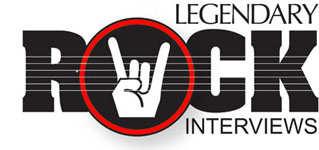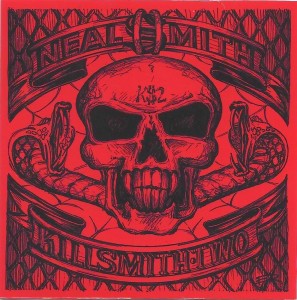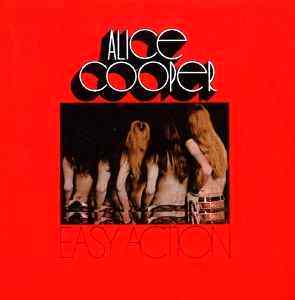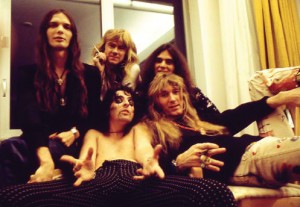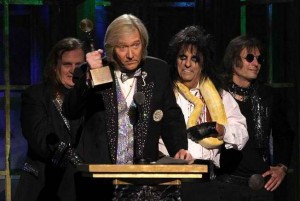Alice Cooper Group drummer NEAL SMITH talks Killsmith, original Alice, Rock Hall of Fame and more
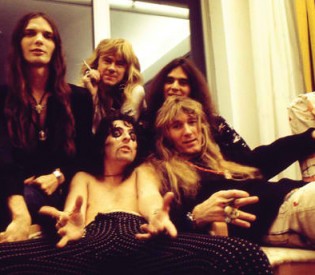
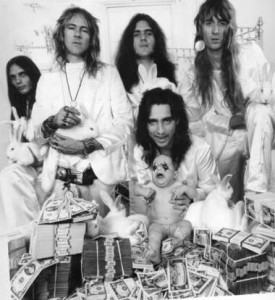 I’ve had the pleasure of interviewing many artists who have worked with Alice Cooper over the years but never a member of the original Hall of Fame group. Recently I had the surreal pleasure of talking to members of the BAND that started it all when I recently talked with legendary drummer Neal Smith and bassist Dennis Dunaway. Neal not only formed the backbone of one of the most important bands in rock and roll history but continues to push the envelope with a solo career that can only be described as uncompromising. In 2011, he y capped off the group’s hall of fame induction year with the release of his latest album KILL$MITH TWO. Neal called to talk to us about his band’s catalog, his feelings about the Rock and Roll Hall Of Fame, KISS, The Doors and his never-ending drive to create. Read on…. (Both Dennis and Neal’s interviews are dedicated to the memory of their fellow Hall of Famer and guitarist Glen Buxton, R.I.P. Glen)
I’ve had the pleasure of interviewing many artists who have worked with Alice Cooper over the years but never a member of the original Hall of Fame group. Recently I had the surreal pleasure of talking to members of the BAND that started it all when I recently talked with legendary drummer Neal Smith and bassist Dennis Dunaway. Neal not only formed the backbone of one of the most important bands in rock and roll history but continues to push the envelope with a solo career that can only be described as uncompromising. In 2011, he y capped off the group’s hall of fame induction year with the release of his latest album KILL$MITH TWO. Neal called to talk to us about his band’s catalog, his feelings about the Rock and Roll Hall Of Fame, KISS, The Doors and his never-ending drive to create. Read on…. (Both Dennis and Neal’s interviews are dedicated to the memory of their fellow Hall of Famer and guitarist Glen Buxton, R.I.P. Glen)
Legendary Rock Interviews: I can’t believe I’m talking to both you and Dennis on the same day as fate would have it. As a longtime fan, I am HONORED. Dennis mentioned in email that I had better spell your name right and I wanted to ask you about your new album (laughs). Tell me some more about it.
Neal Smith: (laughs) Thanks. It’s called KILL$MITH TWO and is the second album of it’s kind that I’ve done. I started with the first KILL$MITH album around 2005 and was really inspired by some of these really heavy, industrial sounding bands that I had seen. One was called Tapping the Vein from Philadelphia and another was called Shirley Temple of Doom from Texas. I saw these really heavy bands like that in New York City and of course bands like Pigface and Rammstein and was just inspired to create something seriously metal and intense. I was just really enjoying these bands and the music they were creating. I have played guitar about as long as I have played drums but just never really done it on a recording. Usually when I write songs I write them from a guitar or keyboard starting point and I just thought with recording capabilities being what they are today I really ought to do this project so I did.
LRI: That’s incredibly ambitious and cool that you continue to grow like that. You always had a really solid, fundamental and almost classic drumming sensibility with your Alice Cooper work and were influenced by that old school Gene Krupa jazz feel. Do you think people were surprised by the heavy, brutal and modern material you’ve been up to lately?
NS: Well, I’m a songwriter first and foremost and always have been going back to the Alice Cooper days. If you look back at the songwriting credits on those albums my name is on quite a few of them in addition to playing drums. I still play drums and always will but I’m not sure if the material has surprised some people. It may have, especially the first album which was pretty explicit lyrically. The second album I am promoting now is a little different lyrically and a little more accessible for airplay which wasn’t really intentional but just more how it all worked out. I’m getting a really favorable reaction from the fans who have them and I’m proud of the albums because it’s all my playing other than the lead guitar. I play drums, rhythm guitar and sing lead vocals so it’s been really cool and fun to be involved with.
LRI: Being a huge Alice Cooper and KISS fan I am also a big “product” nerd so I really, really love the stuff you have going on over on your website. Autographed drumsticks, albums and all that stuff is just making me want to piss my wife off and whip out the debit card. Do you think you’ve gotten to know what your fans want over the years?
NS: I think so. This latest page Nealsmithrocks.com is basically my fourth generation website. I’ve had a page now for over 15 years and of course, as Dennis told you I spell my name Neal the correct way N-E-A-L (laughs). I’m only kidding. It’s fun and I’m glad you like it, there’s a lot of unique photos and content and I have the Neal Smith Classic Drummer Store. About twenty years or so ago people started asking me for them so I decided to start selling things like that. I’ve got my original 1975 solo album debut Platinum God, really all of my solo output is available on there which is pretty fun to finally make available to everyone. It’s not something I’m making hand over fist money doing it’s just nice to be able to do and I make enough to justify the website which is fine.
LRI: I can’t go into a vintage record store and not pick up Alice Cooper vinyl. I will pick up your albums even if I already have a copy of the same one at home. I just think your band really translated well to the format, the packaging and all that, even more so than other acts. How involved were you guys in the creation of those classic album covers and packaging?
NS: We were definitely involved. The very first album, PRETTIES FOR YOU was of course done with Frank Zappa. Frank had a concept of what he wanted to do and so did we. We really love Salvador Dali and wanted to use his painting Geo political Child but it just wasn’t able to work out and we ended up using the work of Ed Beardsley you see which was a painting that Frank had owned. Frank’s photographer also took a bunch of photos of us which you see featured on the album. The second LP, EASY ACTION was interesting. I sort of had the idea, I guess because I had the longest hair,we decided that we do the gender-bending thing and take our shirts off and turn our backs to the camera. The idea with EASY ACTION was were we chicks or guys, of course, looking at it I think we all look like guys but that was the idea at least (laughs). We just sort of threw around ideas like that, LOVE IT TO DEATH was sort of the same thing. We were shooting with this photographer Pridgett and of course Alice had his thumb sticking out from his cape in a sort of phallic suggestion. The KILLER album featured my snake Kachina on the cover who we also used onstage during “Is It My Body”. We had like a thousand pictures of her but only one with her tongue sticking out and we were instantly like “Boom, there’s the album cover.” We also included the calendar in there but of course by that time Warner Brothers and their art department was also starting to get involved with things. By the time we got around to SCHOOLS OUT the concepts start getting really elaborate with the packaging and had actually hired a company Pacific Eye and Ear (Ernie Cefalu) who came up with the little desk design where the record slid into the panties and into the desklid. The Alice Cooper old School boxset that came out recently was also something Pacific Eye and Ear did and it’s basically like the ULTIMATE collection of the complete Alice Cooper Group stuff. That company continued to work with us and did BILLION DOLLAR BABIES, MUSCLE OF LOVE and GREATEST HITS. We were of course in charge of giving the green light to their concepts but by that point we were really comfortable just working on the music and everything Pacific Eye and Ear brought us for packaging just blew us away. You mentioned that you love vinyl and I agree. I think that the artwork and packaging was just such an important part of the overall presentation and that’s something that’s really lost with the new download age. When I did the SEXUAL SAVIOR album I included a 16 page booklet just because I feel so strongly about that. I actually didn’t do quite as much with this latest album because it seemed like noone really made that big of a deal about it. It seems like people now only care about the music itself which is of course the most important but I don’t think ONLY thing. The old double gatefold pieces of vinyl back in the day were certainly a palette where you could really convey another level of art. I miss that and the sound and depth of vinyl which is amazing. I think you’re right John.
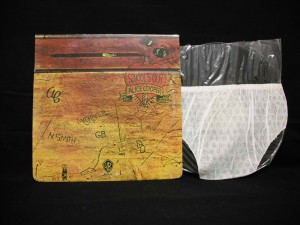 LRI: You certainly had a helluva 2011 with the release of your album and appearance on Alice’s album not to mention the induction into the Rock and Roll Hall of Fame. How do you feel about going from being an infamous, dirty red-headed stepchild of rock to becoming a statesman and member of this elite group?
LRI: You certainly had a helluva 2011 with the release of your album and appearance on Alice’s album not to mention the induction into the Rock and Roll Hall of Fame. How do you feel about going from being an infamous, dirty red-headed stepchild of rock to becoming a statesman and member of this elite group?
NS: Well, it’s sort of bittersweet. They passed over us for so many years and it really pissed me off. Glen Buxton our guitar player is sadly no longer here with us to enjoy it and that sucks. I don’t know why in the hell it took them 16 years to even NOMINATE us. We were eligible in 1994 so, while I don’t understand the rhyme or reason of it and I know that everything like this is political I’ve finally calmed down and come to understand it. When I finally started researching who got in on first nomination it made more sense because it’s like a who’s who of rock and roll. It’s Elvis, the Beatles and Stones and people like the WHO, Beach Boys, Hendrix and all of these people who were influential to me growing up. I noticed that and thought “Well, if we ever get in this is the time to do it”, so when it finally happened I was pretty ecstatic. I was honestly most excited for the fans because they had signed petitions and written letters and made it really clear that they wanted the original band in the Hall of Fame so to me it was a pretty special moment for our fanbase. Having said that, the party and that weekend at the Waldorf Astoria was a BLAST!!!
LRI: Do you think KISS will make it in at some point?
NS: I really have no idea but I can’t see why they wouldn’t. Again, I still don’t understand all the mechanisms and politics. This is really the first year that I’ll be able to vote and I was pretty surprised that KISS wasn’t on the ballot again, I’ll tell you that.
LRI: Speaking of vinyl, the original band and some of your own material is included on the latest Alice Cooper album and THANKFULLY we could all pick that up on vinyl. I know in addition to your solo career you have carved out a whole other million selling career in real estate and all these other things. How was it getting together again with the guys and also producer Bob Ezrin?
NS: Yeah, I was gonna ask if you picked that up on vinyl actually. It was certainly just like old times, that’s for sure. We got together in 1999 with the original, surviving members onstage and it’s like time stands still whenever we play together. There’s nothing in the world more satisfying or comfortable than working with Bob and the guys. The energy and chemistry is still there and I think those three songs really reflect that. Those songs certainly stand out to me on that album. I have a song on my album KILL$MITH TWO called “Evil Voodoo Moon” which is kind of the template or original version of “I’ll Bite Your Face Off”. I had just started writing songs for my album when we found out that Bob and Alice were going to be working on a new album together and wanted us to submit some songs. So, when Michael Bruce and I submitted some songs that was one of the ones I brought in. They changed some of the lyrics and gave it a little more of a Rolling Stones feel as opposed to my version which was a little more AC/DC I guess. It was great working on the Alice album though and I’d love to do it again. It was Bob who produced our breakthrough LOVE IT TO DEATH album which was his first album as a producer but our third album. We were sort of already seasoned in the studio, he was really a young kid but there was definitely a chemistry between us. The combination of his arrangements and our songwriting was really what made it a hit album. Dennis Dunaway and Michael Bruce write fantastic music and Alice writes amazing lyrics and when you put us all together with Bob in the studio it just works. It’s really effortless and natural. It’s kind of like getting together with friends you knew in high school or college. It’s still the same feeling, still the same jokes and that’s really the fun of it for me.
LRI: It’s been hinted that the working relationship between Bob and Glen Buxton was slightly competitive. Would you agree with that?
NS: I don’t know. The fact was that Glen had really strong ideas and Bob had really strong ideas and Bob was hired to produce a hit record. He approached us and worked with us from that perspective of making our image and music something that could be marketed or sold and he did an amazing job of that. His working relationship with Glen might have been a little more difficult but that’s hard for me to speak on. It’s a very personal thing to me because Glen’s my favorite person in the whole world and I really have a hard time speaking about him and not having it come from a personal place rather than a professional place. I of course, did work with him for many, many years but we were best friends aside from that.
LRI: It sounds like you both shared a really dynamic personality, you knew you were in a room with Glen.
NS: Oh god yes. We all were dynamic personalities that was really the thing about the Alice Cooper Group. We were sort of like having five Daffy Ducks all in the same room, everyone was really creative, outgoing and crazy to say the least. Of that cast of characters, Glen was definitely one of the most colorful of the five, that’s for sure.
LRI: Over the years and especially to younger audiences the lines have sadly sort of blurred as far as that goes. How important were each one of you to the overall identity of the band that was called “Alice Cooper”?
NS: It was the truest form of democracy in music that I’ve seen. We were all creative, we all were twenty percent owners and we all did twenty percent of the work. There were times when I did more than that, but the point is that there were equal opportunities for all of us during that whole era. I always loved the fact that we were always open to each others ideas. Any idea I had I always knew that the guys would always consider it or be open to any creation or any thought and that meant the world to me. Whatever I chose to do in a song, whether it was the opening lick to “Billion Dollar Babies” or “Black JuJu” or any one of our songs I never worried that the guys would not be open to it because they always were. It was very equal and noone dominated at any point ever. Michael Bruce wrote the most music but we always brainstormed and created as a group, it was never just one person driving the bus. Michael would bring in a lot of great things but so would Dennis, so would I and that’s just the way the band operated. Even today, I can watch Alice onstage solo and I can see things that he does and his personality but at the same time see Glen’s personality, my personality, Michael, Dennis, all of our personalities within that character of “Alice Cooper”.
LRI: Do you think that’s just because you guys just spent so much time together at such a young and impressionable age?
NS: Oh absolutely. We all influenced each other. A lot of people hear the KILLSMITH stuff I do and say “Wow, I hear an Alice Cooper influence” and it’s like well, yeah. Essentially, all five of us WERE Alice Cooper, that mesh of personalities was what made us a success, none of us would have been able to make it on our own, Alice included.
LRI: What’s your take on the more bizarre, left of center material on the first two albums PRETTIES FOR YOU and EASY ACTION?
NS: I think there’s a lot of Dennis Dunaway on those albums. Dennis was always the dark, sinister force behind the band in a lot of ways and I think those albums really reflect some of that. He wrote a lot of that kind of material, things like “Dead Babies” or “Black JuJu” really reflect a lot of Dennis Dunaway. He’s really the dark side of the band and I think if you listen to those albums there’s a lot more going on than you notice at first glance or get from reading the reviews of those albums. Those arrangements are REALLY intricate and complicated and thought out. If you actually tried to write those compositions out or play them I really doubt a lot of people could pull it off. It’s not simple stuff, it’s very complicated but we loved it and really had to hone those songs, they actually DID evolve quite a bit. People put a lot of stock in Bob Ezrin and our later work as far as the material getting so much more cohesive but the fact is that we were always adapting and changing, A LOT. I think we were evolving before started working with Bob and I know I love those first two albums a lot for what they were. They were NOT improvisational at all and when we played them live they sounded exactly the same.
LRI: Were you kind of taken aback by Zappa’s production approach and the quickness he expected in the studio?
NS: I remember running through a track and him going “Ok, that’s good, that’s a keeper” and saying “What the FUCK are you talking about?? That was one take (laughs).” It was like “WHAT??” I mean, the whole debut album was recorded, mixed in completed in two weeks which is like unheard of. Having said that, we DID know what we were getting into and were happy of course to have the opportunity to record with Frank and make our album. It was our first step, we were taking baby steps and that’s really all I can say about that when I hear it.
LRI: Who really gives a shit about reviews anyway? Some of those same people who gave the early albums bad reviews also gave “Billion Dollar Babies” two stars.
NS: Right and it went to number one around the world so (laughs). There’s always some skeptic or some naysayer. I have a song on my new album which is a favorite track of mine that is called “Kiss My Rock and Roll Ass” which is basically addressed to all the skeptics of the Alice Cooper Group over our career and the people who felt we didn’t “belong” in the Rock and Roll Hall Of Fame. It’s pretty self-explanatory and I just feel like at least we had the vision and confidence to believe in what we were doing even if “they” didn’t. Eventually our manager Shep gained that confidence and Bob Ezrin gained that confidence and the fans really came around to us and gained that confidence and came along with us and had fun with us.
LRI: Did the stage show and the creepy elements of the music just sort of blend together perfectly by the time you got around to international touring on LOVE IT TO DEATH ?
NS: Yeah, it was working for us. It just kept evolving, first the gallows, then the electric chair and then the guillotine. It was all working and we had the music to compliment it and the cool thing was that no one else had ever even tried to do what we were doing so we were able to evolve naturally and it all made sense. It became clear that we were enjoying it and the fans were enjoying seeing something brand new and the crazier we got the crazier they got. It was really magic but that was also the very reason a lot of those skeptics hated us. First of all we were killing that flower power generation in their eyes. The Beatles were gone, Hendrix was gone and everyone that represented that era was either breaking up or dead and we were filling a void that was almost just wide open for us. Once we realized that we were clearly on course to have fun with it. It wasn’t even really a case of “Well, what are we gonna do now?” as much as it was a case of us just pushing and evolving. The natural progression of how it all went down was really an essential part of our chemistry and had a lot to do with how our songs and music evolved as well. The tunes and shows just kept getting better and better and we got into a real undeniable groove.
LRI: Well, the music and lyrical content really did change. You started to incorporate more of your personal experiences and lives into albums like BILLION DOLLAR BABIES and MUSCLE OF LOVE. Do you think the band would have continued to grow and change like that had it not been broken up after the GREATEST HITS album?
NS: Oh without a doubt. I still think we would have been able to maintain the level of success we had career wise too and be at the level of someone like The Rolling Stones. I think we would be playing the same stadiums as the Stones as well because we were the ones that started all that. I mean the Stones weren’t doing theatrics AT ALL. Flash forward to the STEEL WHEELS tours and the Stones are one of the most theatrical shows in the history of touring. I mean, they really haven’t stopped the spectacle since and give them credit, the Stones have always been genuises at ripping off fads as long as they’ve existed. I think what they do is great because it’s still the Stones but it’s just times 1000 and blown up to that spectacular level. I think we’d be on that same level had we all survived and the band stayed intact. Some people will throw around theories that punk would have eventually killed us or whatever but I really don’t agree with that because if you look at the mid 70s there were still PLENTY of great rock bands just emerging and gaining success. Look at AC/DC, Cheap Trick and KISS and tell me that the original Alice Cooper Group wouldn’t have been right in there seamlessly with what was going on. I think it’s a shame because we all were perfectly capable of continuing to write great songs and Alice could write those lyrics and Bob could arrange those tunes. It definitely could have kept moving forward in 1975 and not only moving forward but really taking over. I think we were on the cusp of taking over the world at that moment in time, that’s how close we were and our manager Shep Gordon even says that too, “We were RIGHT there, we were a top ten band and right at the brink of ultimate domination if we had been able to do a couple more tours and a couple more albums”.
LRI: This is sort of painful but true. I know Alice had some major success initially when he went solo with Welcome to My Nightmare and rode that on til around 1980 when he REALLY started to struggle commercially. Do you think the stress of going it alone without his gang was a little too much for Shep, Bob and Alice to bite off?
NS: Well, I know for a fact that it wasn’t an accident that he hit on hard times. Alice and I have even talked about it because he told me that the very first time he went onstage without me he had to learn to adjust. He said that he had gotten so used to that heartbeat and power of the bass drum hitting him on the back of the neck from the drum riser that it was just strange to him. I knew exactly what he meant because although I have played with some pretty amazing musicians over the years it doesn’t compare and isn’t the same as the five of us playing together. He had to really hone in and figure out what Vince Furnier’s version of Alice Cooper supposed to be and it wasn’t easy for him. He ultimately did and really did a great job but it was a process for him. Some of the success of Nightmare and Goes to Hell could certainly be attributed to the steam we built up with the original band but after a couple of albums he really had to figure out who he was and what his new vision was. I think he and Shep had some rough times during the 80s but he ultimately came back as strong as ever and was a force by the end of the decade once again with TRASH. Getting sober also helped save his career and his life, I guarantee it.
LRI: I love KISS but I just think they are a totally different kind of music than the Alice Cooper Group which is much darker and artistic. Do you think there were any other groups pushing that creepy envelope other than you guys or the Doors?
NS: I think Pink Floyd was sort of doing that musically but at the same time they weren’t as diabolical as Alice Cooper Group was. I don’t really have anyone springing to mind to tell the truth, the Doors and us really were really that dark element. The bands that followed like AC/DC or Cheap Trick or KISS were really amazing bands but they just weren’t of that creepy ilk, they were just basically badass rock and roll. That dark cloud that hung over the Doors or us was something that I don’t think a lot of bands could pull off. The thing about what we were doing is that we were both doing it and totally believing it, otherwise it just comes off cheesy as hell. I think Marilyn Manson touched on that place many years down the road but not to the same extent. I really do think you nailed it John as far as us and the Doors, who were not only our contemporaries but also just really great guys and good friends of ours. I mean I was really good friends with John Densmore and Robby Krieger and we did get to know and spend time with Jim Morrison as well and that band absolutely was tapped into that same dark place that we were. Their image, their music and their lyrics were very dark and their show started to go that way as well. They might not have used props or theatrics to the level we did but there was certainly a shared creepiness and I think we were sort of the next progression from what The Doors were doing. I’m not a big fan of American bands but those guys were NOT your average American band by any means.
LRI: Was that friendship you shared a result of being in the L.A. scene together and having that artistic drive?
NS: Yeah, we just wanted attention. We were all art majors in college or film majors and we all wanted to come up with some art that was very different but still entertaining. All we ever wanted to do and the Doors wanted to do was push boundaries and still be entertaining. The other thing we had in common was that we didn’t care if people loved us or hated us but we certainly didn’t want them to FORGET us or not notice us. Trust me, noone that saw the original Alice Cooper Group walked away without a reaction of some sort. I mean whether you loved us or hated us was irrelevant as long as you REALLY loved us or REALLY hated us (laughs).
LRI: Thanks so much for letting us talk to a Hall of Famer. Last question, is that concept of provoking a reaction something that was and still is a guiding principle in your life?
NS: To tell you the truth John, at this point in my life I don’t even think about the reaction as much as I think about staying true to the spirit of whatever the song’s intention was when I initially wrote it. I really have to feel it totally and completely and at this point that’s what is most important to me. I’m 64 years old and at this point what I do just sort of comes natural to the spirit of what I do and whatever it was I brought to the Alice Cooper Group and that’s all that’s important to me. What worked for us as far as being reactionary might not work for a lot of up and coming groups. A lot of groups care deeply about getting a positive reaction or positive reviews to their music and I understand that because their music is everything to them. We really just had a different way of dealing with critics which was to say “Fuck You.”
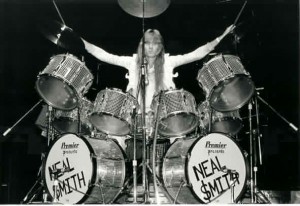 Be sure and check out our interview with Dennis Dunaway next and visit Neal Smith’s website for his latest album and much more at www.nealsmithrocks.com
Be sure and check out our interview with Dennis Dunaway next and visit Neal Smith’s website for his latest album and much more at www.nealsmithrocks.com
Category: Interviews
